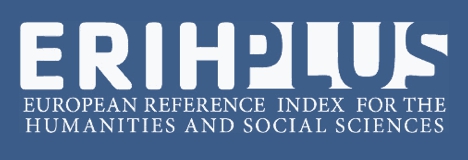Urban socio-environmental problematic: state of the art from the national symposium on urban geography (2013 and 2015)
Abstract
This article proposes to analyze the state of the art about the urban socio-environmental problematic in the context of National Symposium on Urban Geography (SIMPURB), covering the particularities from which urban social-environmental problems have been thematized. The temporary clipping comprised the years of 2013 and 2015. The methodology included a bibliographic review based on the hypothetical-deductive method and the content analysis technique. The analysis showed a set of particularities underlying the subject matter in focus, with emphasis on investigations of socio-environmental conflicts, risks, vulnerabilities, urban resilience solid waste issues and water resources degradation. These multiple possibilities of approach highlight the diversity and complexity of brazilian geographic production in relation to socio-environmental issues inherent in urban spaces.
References
ALMEIDA, L. Q. Riscos ambientais e vulnerabilidades nas cidades brasileiras: conceitos, metodologias e aplicações. São Paulo: Cultura Acadêmica, 2012.
BARDIN, L. Análise de conteúdo. Lisboa: Edições 70, 1977.
BERTRAND G.; BERTRAND, C. Uma geografia transversal e de travessias: o meio ambiente através dos territórios e das temporalidades. Maringá: Ed. Massoni, 2007.
CAMARGO, L. H. R. A ruptura do meio ambiente: conhecendo as mudanças ambientais do planeta através de uma nova percepção da ciência – a geografia da complexidade. Rio de Janeiro: Bertrand Brasil, 2005.
CHRISTOFOLETTI, A. Modelagem de sistemas ambientais. São Paulo: Edgar Blücher, 2001.
CLAVAL, P. Epistemologia da Geografia. 2. ed. Florianópolis: Editora da UFSC, 2014.
COELHO, M. C. N. Impactos ambientais em áreas urbanas: teorias, conceitos e métodos de pesquisa. In: GUERRA, A. J. T.; CUNHA, S. B. Impactos ambientais urbanos no Brasil (Org.). 4. ed. Rio de Janeiro: Bertrand Brasil, 2006.
DESCHAMPS, M. V. Vulnerabilidade socioambiental na região metropolitana de Curitiba. 155f. Tese (Doutorado em Meio Ambiente e Desenvolvimento). Universidade Federal do Paraná. Curitiba, 2004.
DINIZ, M. T. M. Contribuições ao ensino do método hipotético-dedutivo a estudantes de Geografia. Geografia Ensino & Pesquisa, v. 19, n. 2, p. 107-111, 2015.
MENDONÇA, F. Geografia socioambiental. In: MENDONÇA, F.; KOZEL, S. Elementos de epistemologia da Geografia contemporânea (Org.). Curitiba: Editora da UFPR, 2002. p. 121-144.
______. S. A. U. – Sistema socioambiental urbano: uma abordagem dos problemas socioambientais da cidade. In: MENDONÇA, F. Impactos socioambientais urbanos. Curitiba: Editora da UFPR, 2004. p. 185-207.
______. Riscos, vulnerabilidades e resiliência socioambientais urbanas: inovações na analise geográfica. Revista da ANPEGE, v. 7, n. 1, p. 111-118, 2011.
______. Geografia e meio ambiente. 9. ed. São Paulo: Contexto, 2014.
MENDONÇA, F.; BUFFON, E. A. M.; CASTELHANO, F. J.; SITOE, G. Resiliência socioambiental-espacial urbana a inundações: possibilidades e limites no bairro Cajuru em Curitiba (PR). Revista da ANPEGE, v. 12, n. 19, p. 279-298, 2016.
MORAES, A. C. R. Meio ambiente e ciências humanas. 2. ed. São Paulo: HUCITEC, 1997.
MOREIRA, R. O discurso do avesso: para a crítica da Geografia que se ensina. São Paulo: Contexto, 2014.
PINTO, L. R. A abordagem socioambiental na geografia brasileira: particularidades e tendências. 199f. Tese (Doutorado em Geografia). Programa de Pós Graduação em Geografia. Universidade Federal do Paraná, Curitiba, 2015.
REIS JÚNIOR, D. F. D. O humano pelo viés quantitativo: um exame do (neo)positivismo em Speridião Faissol, através da leitura de textos selecionados. 141f. Dissertação (Mestrado em Geografia). Universidade Estadual Paulista, Instituto de Geociências e Ciências Exatas, 2003.
RODRIGUES, A. M. Produção e consumo do e no Espaço: problemática ambiental urbana. São Paulo: Hucitec, 1998.
ROSS, L. J. S. Ecogeografia do Brasil: subsídios para o planejamento ambiental. São Paulo: Oficina de Textos, 2006.
SANTOS, J. O. Fragilidade e Riscos Socioambientais em Fortaleza-CE: contribuições ao ordenamento territorial. 331f. Tese (Doutorado em Geografia). Programa de Pós-Graduação em Geografia Física. Universidade de São Paulo. São Paulo, 2011.
SANTOS, J. O.; ROSS, J. L. S. Fragilidade ambiental urbana. Revista da ANPEGE, v. 8, n. 10, p. 127-144, 2012.
SIMPÓSIO NACIONAL DE GEOGRAFIA URBANA, 13., “Ciência e Política: Por uma Abordagem Crítica”, Rio de Janeiro, RJ, 2013. Anais... Rio de Janeiro, RJ, 2013. 1 CD-ROM.
SIMPÓSIO NACIONAL DE GEOGRAFIA URBANA, 14., “Perspectivas e Abordagens da Geografia Urbana no Século XXI”, Fortaleza, CE, 2015. Anais... Fortaleza, CE, 2015. 1 CD-ROM.
SOTCHAVA, V. B. O estudo de geossistemas. Métodos em questão, IG/USP, n.16, p. 2-52. São Paulo, 1977.
SOUZA, M. B.; MARIANO, Z. F. Geografia Física e a questão ambiental no Brasil. Revista GEOUSP, n. 23, p. 77-98, 2008.
SUERTEGARAY, D. M. A. Geografia física (?) Geografia ambiental (?) ou Geografia e ambiente (?). In: MENDONÇA, F.; KOZEL, S. (Org.). Elementos de epistemologia da Geografia contemporânea. Curitiba. Editora da UFPR, 2002.
TRICART, J. Ecodinâmica. Rio de Janeiro, IBGE-SUPREM, 1977.
VICENTE, L. E.; PEREZ FILHO, A. Abordagem sistêmica e Geografia. Geografia, Rio Claro, v. 28, n. 3, p. 323-344, 2003.
Keywords

This work is licensed under a Creative Commons Attribution-NonCommercial 4.0 International License.
Policy Proposal for Free Access Journals
Authors who publish in this journal agree to the following terms:
a. Authors retain the copyright and grant the journal the right of first publication, with the work simultaneously licensed under the Creative Commons Attribution License which allows the sharing of the work with acknowledgment of the authorship of the work and initial publication in this journal.
b. Authors are authorized to take additional contracts separately, for non-exclusive distribution of the version of the work published in this journal (eg publish in institutional repository or as a book chapter), with acknowledgment of authorship and initial publication in this journal.
c. Authors are allowed and encouraged to publish and distribute their work online (eg in institutional repositories or on their personal page) at any point before or during the editorial process, as this can generate productive changes, as well as increase the impact and The citation of published work (See The Effect of Free Access).





















